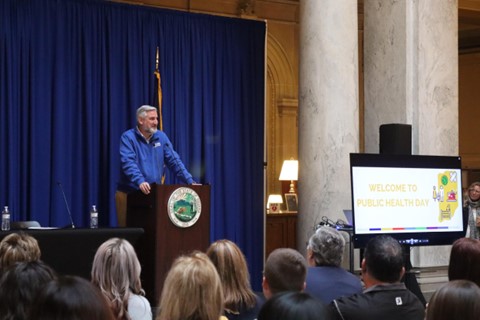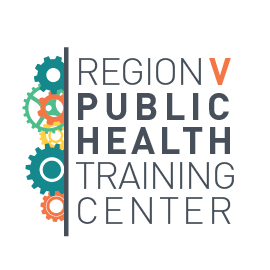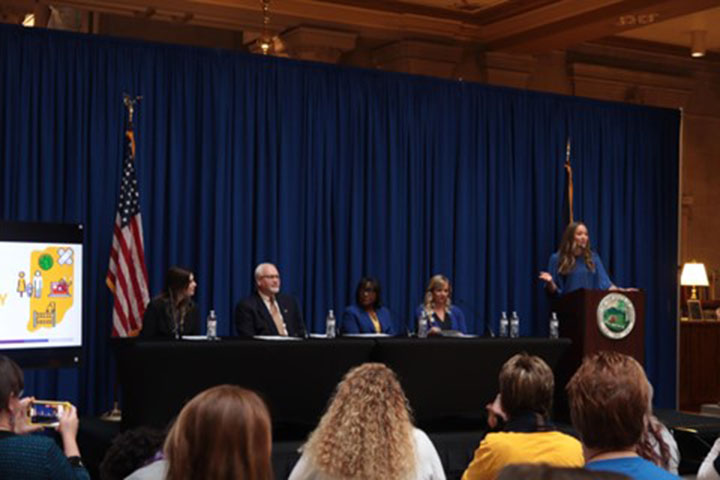By Sara Suisman, MPH and Marissa Byers
All people deserve the chance to live, work, worship, play, and age in healthy, thriving communities. Our public health system bears much of the responsibility to ensure that this is possible through upstream efforts and policy, systems, and environmental change. We know that downstream efforts (e.g., healthcare services) are essential to sustain healthy communities, but are insufficient without support.
Unfortunately, public health has long been under-resourced and underfunded, which impedes our ability to deliver on promises to promote and protect the health of our communities. Historically, Indiana has performed poorly in measures of public health funding and health outcomes, and these deficiencies were made glaringly obvious throughout the COVID-19 pandemic. Many of our 94 local health departments have limited capacity, staff, and funding to deliver essential public health services. Indiana has existing gaps and therefore massive opportunity for improvement of the existing public health system to ensure the health of all Hoosiers (IU Richard M. Fairbanks School of Public Health, 2020).
On August 18, 2021, Governor Eric J. Holcomb established the Governor’s Public Health Commission through Executive Order 21-21. The Commission was composed of 15 members, including the Indiana Public Health Association’s Administrator, Kim Irwin. The Commission was charged with evaluating the current public health system in Indiana, identifying opportunities for improvement, and issuing a report of recommendations to the Governor. The Commission met monthly from September 2021 through June 2022, during which time Commission members assessed various topic areas of importance, or “workstreams:”

Advocates filled out cards about why public health matters to them to share with their legislators.
- Governance, Infrastructure, and Services
- Public Health Funding
- Workforce
- Data and Information Integration
- Emergency Preparedness
- Child and Adolescent Health
During this time, public comment was also collected via an online form, and this feedback was shared with Commission members at each meeting. Information gathering sessions, or “listening tours”, also took place in various locations across Indiana to gather additional public input.
In July 2022, a final Commission report was released. In particular, the report calls for a substantial increase in public health funding to “achieve consistent per capita spending at 2019 national average of $91 per person as compared to Indiana’s $55 per person” (Indiana Department of Health, 2023). This increased funding would also help to “ensure consistent delivery of public health services across Indiana”, another goal named in the report (Indiana Department of Health, 2023). As anticipated, the Commission’s recommendations have informed legislative priorities for the 2023 session. Most notably, the Governor is pursuing a $120 million budget in fiscal year 2024 (and $227 million in 2025) to improve public health services delivery statewide.
On January 19th, the Indiana Public Health Association (IPHA) hosted our 2023 Policy & Advocacy Forum, “From Recommendations to Reality: Your Role in Advocating for Public Health in Indiana”. At this virtual event, our statewide partners learned from subject matter experts how to advocate for public health systems change at the local level.

Indiana Governor Eric J. Holcomb speaks to public health professionals and advocates during Public Health Day at the Statehouse.
A week later, on January 26th, the Indiana Department of Health convened Public Health Day at the Indiana Statehouse, during which public health workers, students, partners, and advocates gathered to celebrate the work of the Commission and show support for critical investment in Indiana’s public health system.
IPHA is eagerly awaiting key legislative updates pertaining to the Governor’s Public Health Commission, and our organization is poised to continually support and guide efforts to create a healthier future for all Hoosiers. Continued public health advocacy is essential to strengthening our upstream systems and equipping downstream organizations and public health workers to protect their communities.
To learn more, check out these resources:
- Indiana’s Governor’s Public Health Commission
- IPHA’s workforce development blog post

